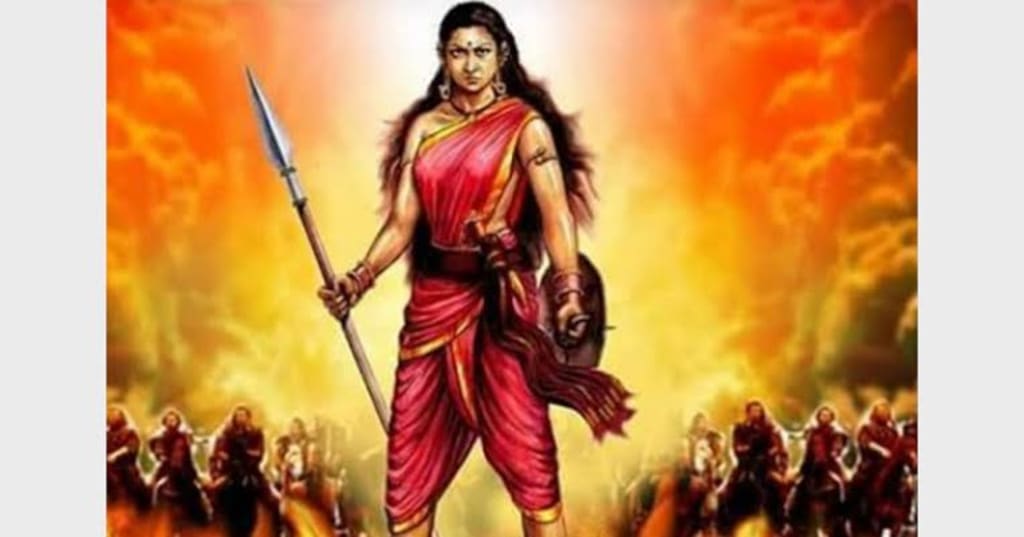
I
Velunachiyar, also known as Veeramangai Velunachiyar, was a queen and warrior from the 18th century in South India. She was born in 1730 CE in Sivaganga, Tamil Nadu, to the king of Sivaganga, Muthuvaduganatha Periya Udaiyar.
Velunachiyar was trained in martial arts and warfare from a young age, and she proved to be a skilled warrior. She was married to Muthuvaduganatha Thevar, the king of Sivaganga, and she became the queen of the kingdom after his death.
During the Second Carnatic War between the British and the French, Velunachiyar formed an army and fought against the British. She was instrumental in driving the British out of Sivaganga and surrounding areas, and she became a symbol of resistance against British colonial rule.
Velu Nachiyar was a courageous queen who ruled Sivagangai in Tamil Nadu, India, during the 18th century. Her notable achievements include:
Led a successful military campaign: Velu Nachiyar waged a fierce battle against the British East India Company and defeated them in the year 1780. She achieved this victory by forming alliances with the Marathas and the Mysore Kingdom.
Built a strong army: Velu Nachiyar was instrumental in building a strong army consisting of women soldiers, commonly known as 'udaiyaal'. These women warriors were trained in martial arts and were well equipped to defend their kingdom.
Constructed a secret tunnel: To escape the enemies, Velu Nachiyar built a secret tunnel that connected her palace to a nearby temple. This tunnel was used to move her army and important people out of the palace in times of danger.
Implemented welfare measures: Velu Nachiyar implemented various welfare measures for the welfare of her people. She abolished the practice of untouchability and provided education to the underprivileged.
Honored by the Government of Tamil Nadu: In recognition of her contribution to the freedom struggle, the Government of Tamil Nadu established a statue in her honor and named a women's university after her. She remains an inspiration to many women in India.
Bravery
Velu Nachiyar was married to Muthuvaduganathaperiya Udaiyathevar, the king of Sivagangai. After her husband's death, the East India Company took control of Sivagangai. Velu Nachiyar fled to the jungles of Dindigul with her daughter, where she gathered an army of loyal followers.
Velu Nachiyar trained her army in guerrilla warfare tactics and formed an alliance with Gopala Nayaker and Hyder Ali, who were also fighting against the British. She also recruited women warriors, who were trained to fight with swords and spears.
In 1780, Velu Nachiyar led her army in an attack on the British-controlled fort at Virupakshi, near Dindigul. She and her troops disguised themselves as merchants and approached the fort with baskets of flowers. Once they were inside, they attacked the British soldiers and set fire to the fort, destroying it.
Velu Nachiyar continued to fight against the British and liberated many towns from their control. She died in 1790 and was succeeded by her daughter Vellacci.
Velu Nachiyar is remembered as a courageous and fearless queen who fought against the British and defended her kingdom. She is also known for being one of the first women to wage war against the British colonial powers.
Velunachiyar was a courageous and inspirational queen who fought against the British East India Company in the late 18th century. She was the queen of Sivagangai and took up arms against the British in order to protect her kingdom and people from their oppressive rule.
Velunachiyar's story is a testament to the strength and determination of women, especially during a time when they were often marginalized and oppressed. She showed that women are just as capable as men in leadership and combat, and her legacy has continued to inspire generations of women in India.
Overall, Velunachiyar's life and actions are an important part of Indian history and a reminder of the resilience and bravery of those who fought against colonialism and oppression.
As for her death, Velunachiyar died in 1790, although the exact date is not known. She is believed to have died at a ripe old age, having lived a full and eventful life.
Today, Velunachiyar is remembered as a symbol of courage and resistance against oppression, and she continues to inspire people in Tamil Nadu and beyond.
verheiringdoms





Comments
There are no comments for this story
Be the first to respond and start the conversation.